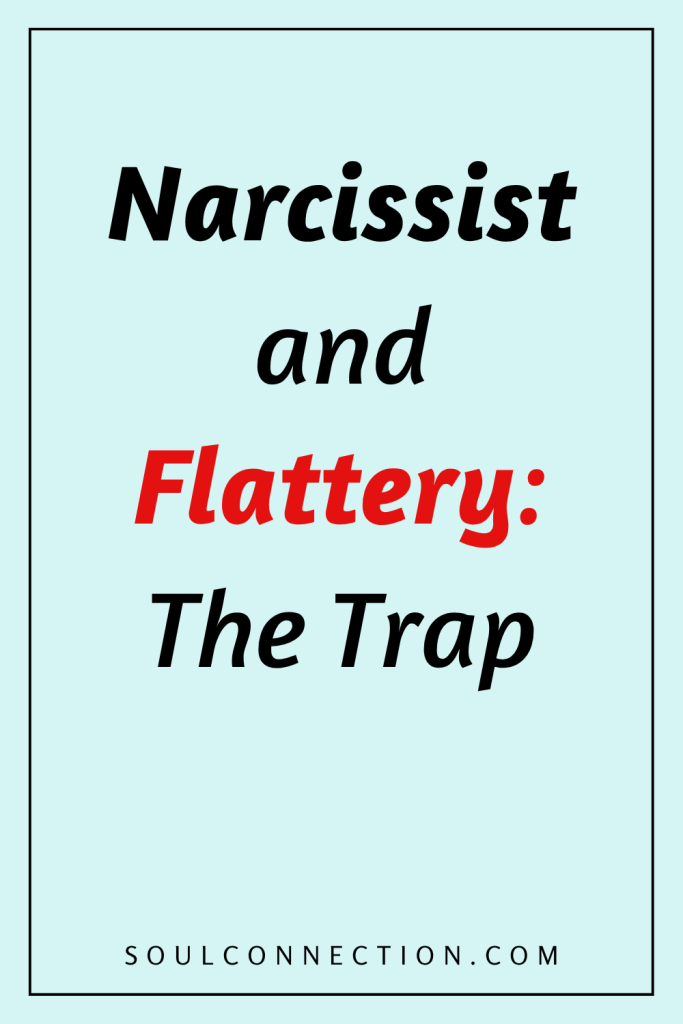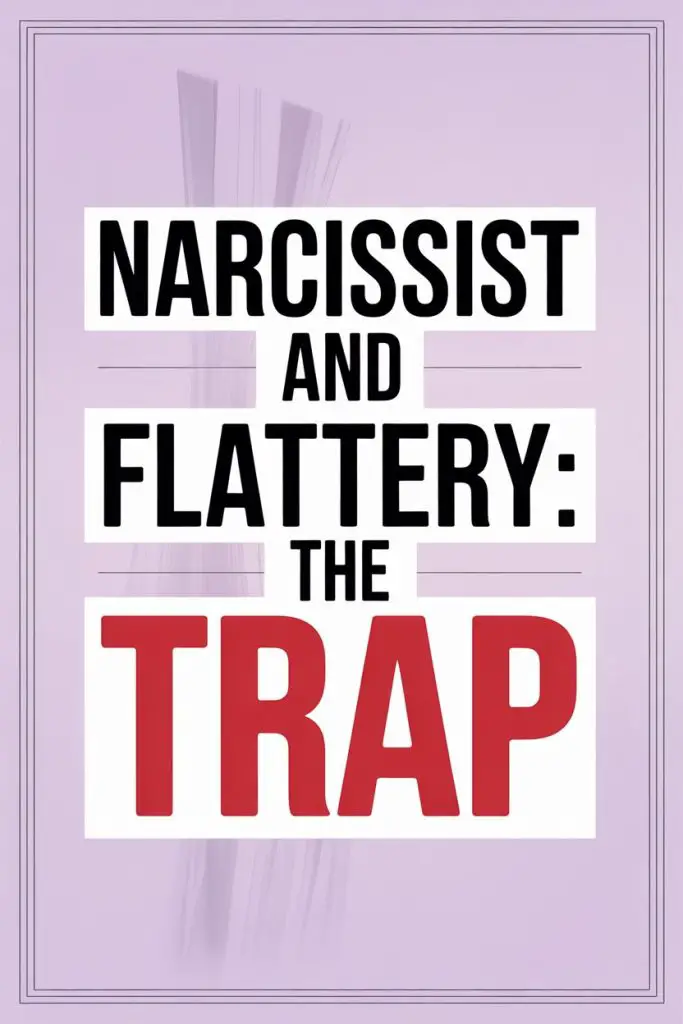Narcissists have a reputation for soaking up compliments like a thirsty sponge at a spilled wine party. If you’ve ever felt like your praise disappears into a black hole, with not so much as a crumb of gratitude in return, welcome to the club.
Pull up a chair. It’s time to talk about how flattery—when mixed with narcissism—can be a mind-bending trap.
Why Flattery Hooks a Narcissist
A narcissist’s relationship with admiration could outlast an old-school soap opera. Compliments aren’t just nice; they’re vital sustenance.
Every “You’re so amazing!” or “No one does it quite like you!” is treated as sacred nectar.
Picture it: You compliment your narcissistic partner on their dinner, their work, or their new haircut.
Rather than a bashful “Aw, shucks,” you get a triumphant grin and, sometimes, a subtle expectation that praise will be a recurring fixture (you know, like taxes).
The thing is, narcissists see flattery less as a gift and more as their due. The attention and admiration reinforce their self-image and become the currency of the relationship.
When flattery is withheld, it’s like their emotional ATM suddenly stops dispensing cash.
The Subtle Slide into Flattery Dependency
In the early days, flattery feels harmless. Who doesn’t like being adored?
The trouble starts when you realize your compliments have become less about expressing genuine appreciation and more about managing someone’s mood, avoiding conflict, or keeping the peace.
Suddenly, you’re tiptoeing through daily life, throwing out lines like, “Wow, no one parallel parks like you.” (Even when they almost sideswiped the mailbox.)
Why? Because life’s just easier if the narcissist in your orbit feels seen, adored, and—as always—the center of attention.
This slow shift from genuine praise to strategic flattery is where the trap tightens. You become the caretaker of their ego, a role you never auditioned for but seem to play on repeat.
When Flattery Backfires
Here’s where things get spicy. While most people appreciate a kind word, narcissists tend to inflate praise into proof of their inherent superiority.
It’s not “Thanks, that means a lot,” but “Obviously. I am, as always, the best.”
Too much flattery doesn’t just make them happy. It can actually make them more demanding, less empathetic, and more dismissive of your needs.
Why listen to someone who already knows they’re perfect? To them, your compliments are confirmation that their worldview is correct, and their critics are simply jealous or uninformed.
The kicker? When you start holding back—maybe because you’re exhausted or you just want one dinner without the ego parade—watch out. Withdrawal symptoms can include sulking, criticism, or flat-out emotional fireworks.
Emotional Labor and the Praise Economy
Living with or loving a narcissist often means signing up for a permanent part-time job: ego maintenance. The never-ending need to prop up someone else’s self-worth doesn’t come with sick days or overtime pay.
Flattery becomes the currency, and you’re stuck footing the bill.
What does this look like in real life? Maybe you find yourself apologizing for things that weren’t your fault, or you talk yourself out of voicing your own needs because “they’re under a lot of stress.”
You become the emotional barista, brewing up compliments to go, hoping each one buys a few hours of peace.
Meanwhile, your own emotional needs start gathering dust in the corner. Who’s telling you you’re fabulous? Who’s noticing when you pull off something impressive? (If you’re lucky, maybe your dog. Dogs never miss a trick.)
Spotting the Trap Before It Closes
It’s easy to blame yourself for getting caught in the flattery trap. You might tell yourself, “If I’d just been more assertive…” or “Maybe I’m too sensitive.”
But narcissists are skilled at drawing people into these dynamics. They don’t announce their intentions—they charm, cajole, and, when needed, guilt-trip.
Classic warning signs:
- You feel nervous or guilty when you don’t compliment your partner.
- Disagreements quickly morph into arguments about how you “never appreciate” them.
- Your praise feels automatic—like a chore, not a choice.
- You downplay your own achievements to avoid overshadowing them.
- The relationship’s emotional thermostat is always set to their comfort level.
If this sounds familiar, you’re not alone. And—contrary to what your narcissist might imply—it’s not a flaw in your character.
Why Narcissists Need Flattery Like Fish Need Water
There’s a reason narcissists gobble up flattery: their self-esteem is, frankly, built on sand. Underneath the bravado, insecurity simmers.
Flattery is a quick fix, a way to paper over doubts and silence the inner critic. Each compliment temporarily plugs the leaks in their self-worth bucket.
But much like eating a bag of lollies when you’re starving, the satisfaction is fleeting. The more praise they get, the more they crave.
Authentic connection—built on vulnerability, give and take, and actual empathy—remains elusive.
Your Needs Matter Too
This is the bit narcissists hope you’ll skim. Relationships thrive when both people feel seen, valued, and respected. If flattery is always flowing one way, resentment and exhaustion aren’t far behind.
Healthy love doesn’t require Olympic-level ego gymnastics. It’s about real appreciation, honest feedback, and mutual support. If you find yourself stuck in a cycle where your needs are routinely sidelined, it’s time to look at the balance of power.
Tough talk: You’re not selfish for wanting recognition. You’re not demanding for craving genuine partnership. You’re human.
How to Break Free from the Flattery Trap
Ready to hang up your gold medal in ego maintenance? Here’s the not-so-secret recipe:
- Dial Back the Automatic Compliments
Notice when you’re flattering out of habit, not sincerity. It’s okay to skip applause now and then. If it’s not heartfelt, hold that thought. - Speak Up About Your Own Needs
Request appreciation for your efforts. Share your feelings when praise feels one-sided. A balanced relationship means both parties are seen and valued. - Set Boundaries with Grace (and Grit)
The next time you feel pressured to compliment, ask yourself: Does this feel authentic, or is this damage control? Boundaries aren’t rude. They’re essential. - Normalize Discomfort
Expect some pushback. Narcissists are allergic to criticism and might dial up the drama. Stay calm, stand your ground, and resist the urge to smooth things over with more flattery. - Seek Outside Support if Needed
Chat with friends, trusted family, or a therapist. Sometimes you need a neutral voice to help you spot the pattern (and remind you you’re not losing it). - Celebrate Your Own Wins
Can’t rely on your partner for that celebratory high five? Buy yourself flowers. Text a mate. Recognize your own brilliance.
Flattery Without the Trap
Flattery, when genuine and mutual, is one of the small joys of intimate relationships. We all want to feel adored and admired—just not at the expense of our own needs or sanity.
Narcissists can make praise feel like a performance, but that doesn’t mean you have to join the show. Save your compliments for moments that feel true. Protect your energy. And don’t forget: Self-respect looks good on everyone.
When Flattery Stops Working
There comes a point where compliments feel less like a relationship glue and more like wallpaper paste: sticky, bland, and impossible to remove without a heat gun.
If your attempts at flattery are met with irritation, indifference, or new demands, it’s a sign the dynamic has run its course.
Some narcissists respond by seeking fresh admirers—someone new to refill the praise tank. This isn’t a reflection of your worth, but of their bottomless appetite for validation.
If you catch yourself, once again, rehearsing compliments in the shower, it might be time to ask if this is what partnership should feel like.
Partners, Not Props
No one should be cast as a permanent supporting actor in their own life. Relationships thrive on mutual respect and honest appreciation, not on an endless loop of “You’re the best!” delivered with a side of anxiety.
If you feel more like a cheerleader than a cherished partner, it’s okay to step back, take inventory, and reimagine what healthy admiration looks like. A real partner wants to share the spotlight, not hoard it.
It’s Not You—It’s the Trap
The pull of the flattery trap is real, and escaping it takes guts. The good news? You’re not alone, you’re not crazy, and you’re certainly not doomed to a lifetime of fake applause.
Flattery should feel good for both people. If it’s become a requirement—one that leaves you feeling drained and unseen—maybe it’s time to hand back the pom-poms and pick up some self-respect instead.
No one should have to flatter their way into love. Not even on a Monday.


